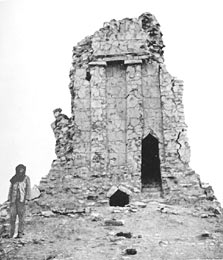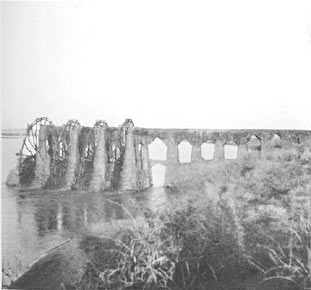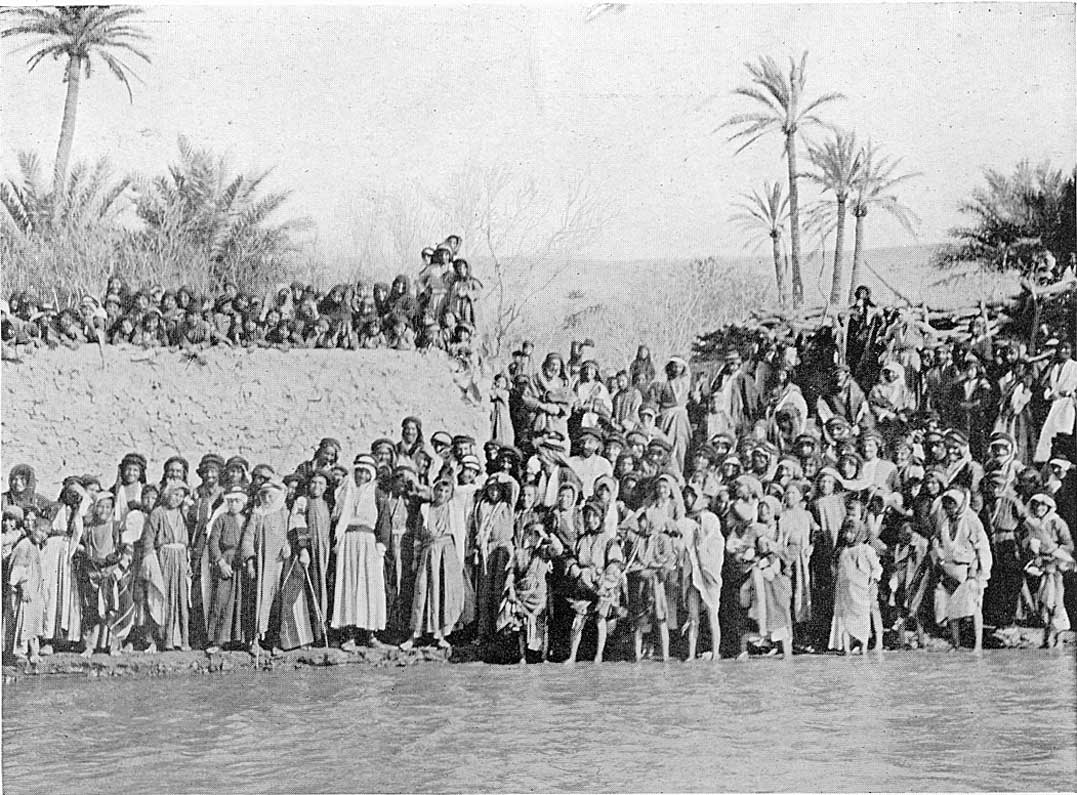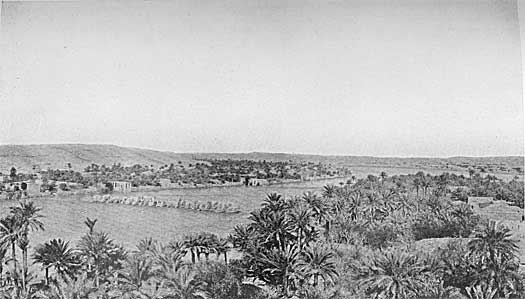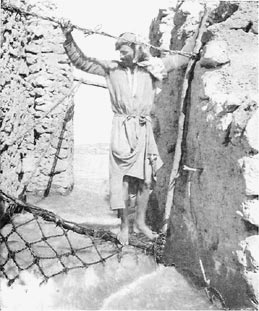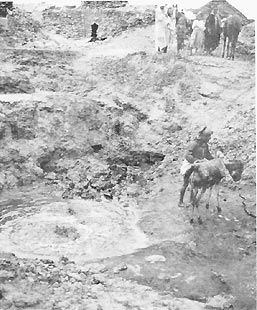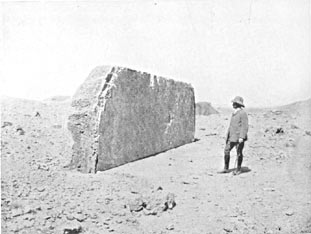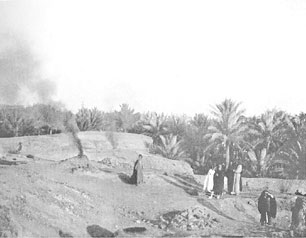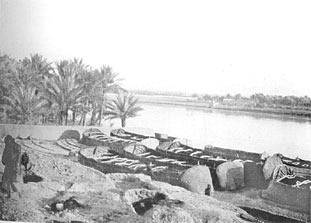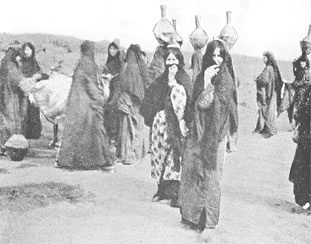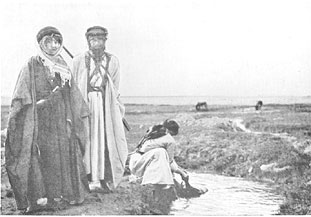[ p.77 ]
CHAPTER III
BUSEIRAH TO HÎT
March 7—March 18
AT Buseirah we were confronted with one of the difficulties that awaits the traveller in the Jezîreh. Since there is no traffic along the left bank of the river, there are no zaptiehs to serve as escort; my two zaptiehs from Deir were to have been relieved at Buseirah, but there was only one available man there, and he feared the return journey alone, and was therefore extremely reluctant to come with us. We solved the question by carrying off Mustafâ, one of the men from Deir, whereupon Hmeidî, the Buseirah zaptieh, consented to bear him company. Both were to return from Abu Kemâl, three days' journey lower down. This plan suited Hmeidî well, for he was a doubly married man, and while one of his wives remained at Buseirah, the other dwelt at Abu Kemâl. His beat was between the two places. "And so," he explained, "I find a wife and children to welcome me at either end."
"That is very convenient," said I.
"Yes," he replied gravely.
We crossed the Khâbûr in a ferry-boat so badly constructed that loaded animals could not enter it, and in consequence all the packs had to be carried down to the river and re-loaded on the other side. I pitied Cyrus from the bottom of my heart, and regarded Julian's bridge with feelings very different from those that had been conjured up by the moon of the previous night. The level ground on the opposite side was covered with potsherds, most of them blue and green glazed wares, and all, so far as I saw, Mohammadan. An hour later we passed over another small area strewn thickly with the same pottery, and while I was acquainting Hmeidî with the nature / p.78 / of the evidence it supplied, I took occasion to confide to him my belief that the ruin at Buseirah which they call the church dates from the Mohammadan period.
"Effendim," he replied, "what you have honoured us by observing is quite correct. The origin of that church is Arab. It was doubtless built by Nimrod, who lived some years before Hârûn er Rashîd."
"That is true," said I, with a mental reservation as to parts of the statement.
Between the Khâbûr and the Euphrates, Kiepert marks an ancient canal and names it the Daurîn. According to the map it leaves the Khâbûr at a point opposite to the village of Höjneh and joins the Euphrates opposite Sâlihîyeh.1
---------------------------
1 Sachau travelled up the left bank of the Khâbûr, and should therefore have crossed the course of the canal, but he makes no mention of it.
---------------------------
The existence of the canal cutting is well known to all the inhabitants of these parts (they call it the Nahr Dawwarîn), but they affirm that its course is much longer than is represented by Kiepert, and that it touches the Euphrates at Werdî. My route on the first day lay between the canal and the Euphrates, at a distance that varied from an hour to half-an-hour from the river, and though I did not see the Dawwarîn, its presence was clearly indicated by the line of Kanâts (underground water conduits) running in a general southerly direction — NNW. to SSE. to be more accurate — across ground that was almost absolutely level. The whole of this region must once have been cultivated, and it had also been thickly populated.2
---------------------------
2 I should conjecture that on the Euphrates as on the Tigris the disappearance of the settled population dates from the terrible disaster of the Mongol invasion.
---------------------------
Twenty-five minutes' ride beyond the potsherds where Hmeidî had sketched for me the history of Buseirah, we passed some foundations constructed out of the smaller sort of tiles which I had observed in the town. A quarter of an hour further there was a low mound called Tell el Krah, covered with tiles and coloured pottery — indeed the pottery was continuous between the one patch of broken tiles and the other, and Nimrod had evidently been very busy here. The villages / ZEITHA p.79 / represented by these remains had been supplied with water from the Dawwarîn. In another hour and five minutes we reached a considerable mound, Tell Buseyih; it formed three sides of a hollow square, the side turned towards the river being open. We were now close to the Euphrates and could see, about half-a-mile away, a long tract of cultivation and the village of Tiyâna on the water's edge. We turned slightly inland from Buseyih and in fifty minutes came to the mounds of Jemmah where, so far as identification is possible on a hasty survey, I would place Zeitha. "Here," says Ammianus Marcellinus, "we saw the tomb of the Emperor Gordian, which is visible for a long way off." Jemmah consists of a large area surrounded by a wall and a deep ditch; beyond the ditch lies broken ground where, at one point, the Arabs had scratched the surface and revealed what looked like a pavement of solid asphalt; still further away there is an Arab graveyard strewn with fragments of the smaller tiles. Except in the graveyard there are no tiles and very little pottery, none of it characteristically mediaeval Mohammadan. The ditch had been fed by a water channel coming from the north-east, no doubt an arm of the Dawwarîn if it were not the canal itself. We rode from Jemmah to the Euphrates in an hour and ten minutes and found the camp pitched immediately below the village of Bustân. The baggage animals had been six hours on the march from the Khâbûr. The climate was changing rapidly as we journeyed south. The last cold day we experienced was March 2, when I had ridden out to Tell esh Sha'îr; on March 7 when we camped at Bustân the temperature at three o'clock in the afternoon was 70° in the shade, but the nights were still cold.
A strip of irrigated land and numerous villages lay along the river for the first two hours of the succeeding day's march. We were forced to ride outside the cornfields that we might avoid the water conduits, but I do not think we missed anything of importance, for every twenty or thirty years the Euphrates rises high enough to submerge the cultivation, and the floods must have destroyed all vestiges of an older civilization. The low-lying fields cannot have been, within historic / p.80 / times, a former bed of the stream, as was the case above Buseirah; an occasional mound near the river showed that the bank had long been inhabited. We passed on the high ground a tell that looked like the site of an ancient village which had received its water from the Nahr Dawwarîn. An enormous amount of labour is expended upon the irrigation of the cornfields; sometimes there is a double system of jirds, those nearest the river watering the lowest fields and filling deep channels whence the water is again lifted by another series of jirds to the higher level. In the lower ground the peasants grow a little corn and clover for early pasture and sow a second crop when the spring floods have retreated. After two hours' riding we entered a long stretch of sand heaped up into little hills which were held together by tamarisk thickets; it is apt to be submerged when the river is high, and we saw more than one overflow channel filled with pools of stagnant water. On the Syrian side the Euphrates is hemmed in here by hills whereon stands the castle of Sâlihîyeh. In this wilderness we came upon some Arabs who were ploughing up a desolate spot in search of locusts' eggs.
Are there many locusts here?" said I, for locusts are not accustomed to lay their eggs in sand.
"No," they answered, "there are none here; but, as God is exalted ! there are thousands lower down."
"Then why do you plough here ?" I asked, with the tiresome persistence of the European.
"The government ordered it," said they, and resumed their task.
In another hour we reached Tell ech Cha'bî (el Ka'bî ?) where there is an Arab cemetery, the graves covered with unglazed potsherds. Hmeidî told me that when the Arabs bury their dead in such places they dig into the mound and extract broken pottery to strew upon the graves; the Bedouin use no pottery, their water-vessels being of copper or of skin. While we sat upon the top of the tell lunching and waiting for the caravan, which was delayed for nearly an hour in the loose sand, Hmeidî gave me his views on politics.
/ TELL ABU'L HASSAN p.81 /
"Effendim," said he, "we do not care what sultan we have so long as he is a just ruler. But as for 'Abdu'l Hamîd, he keeps three hundred women in his palace, and, look you, they have eaten our money." Wherein he wronged the poor ladies; it was not they who scattered the revenues of the State.
In thirty minutes we came to Tell Simbal, a small sandy mound; in one hour and fifteen minutes more to Tell el Hajîn, with a village by the river, and after another hour and twenty minutes to Tell Abu'l Hassan, where we camped, seven and a quarter hours from Bustân. Abu'l Hassan is marked in Chesney's map as "mound." It is a very striking tell rising fifty feet above the river; upon the summit are Arab graves strewn with coarse pottery and with undressed stones dug out of the hill, and for a distance of a quarter of an hour's walk to the north and east there are fragments of brick upon the ground. The graves are those of the Jebbûr, who, said Hmeidî, left this district thirty years ago and migrated to the Tigris, where I subsequently saw them. Nearly all the Silmân have also gone away, and though their camping grounds are marked by Kiepert on the Euphrates, their present quarters are on the Khâbûr. The Deleim and the Ageidât, a base-born tribe, together with the Bu Kemâl, now occupy the Euphrates' banks, and the 'Anazeh come down to the river in the summer. There was no living thing near our camp except an enormous pelican, who was floating contentedly on the broad bosom of the stream. Our advent roused in him the profoundest interest, and as he floated he cast backward glances at us, to see what we were doing in his wilderness.
A pleasant four hours' march, mostly through tamarisk thickets that were full of ducks, pigeons and jays, brought us to the ferry opposite Abu Kemâl. When we had pitched our tents near the reed- and mud-built village of Werdî, Fattûh and Selîm went across to buy corn and Hmeidî to report our arrival and ask for fresh zaptiehs. The village of Abu Kemâl has recently been removed to a distance of about a mile from the right bank, because the current has undermined the / p.82 / foundations of the original village, which now stands deserted and in ruin. But it is chiefly on the left bank that the river has played tricks with the land. Within the circuit of a great bend in the channel, the ground for three miles or so is extremely low, and is partially submerged when the stream comes down in flood. The low ground is bounded on its eastern side by a rocky ridge which crosses the desert from a point a little to the south of the Khâbûr, passes behind what I suppose to be the course of the Dawwarîn, and terminates in the bold bluffs of Irzî above the Euphrates, at the lower limit of the Werdî bend. When the river is exceptionally high it covers the whole area up to the hills; my informant, one 'Isâ, an Arab of the Bu Kemâl, remembered having once seen this occur; but in ordinary seasons it merely overflows a narrow belt and fills a canal that lies immediately under the eastern hills. The canal is fed by two branch canals from the river and joins the Euphrates under the bluff of Irzî. The river rises "at the time of the flowering of pomegranates," said 'Isâ, "for unto all things is their season," that is, about the middle of April; but the big canal under the hills was still half full of water when I saw it in March, and the crops were irrigated from it by jirds. It is known locally as the Werdîyeh, but I was informed that it was in fact the lower end of the Dawwarîn which joins the Euphrates here and not at Sâlihîyeh.1
---------------------------
1 I looked carefully for any trace of a big canal opposite Sâlihîyeh and saw none.
---------------------------
The site of Werdî is generally believed to be that of Xenophon's Corsote, "a large deserted city which was entirely surrounded by the Mascas." The river Mascas was a plethron (100 ft.) in breadth; the army of Cyrus stayed there three days and the soldiers furnished themselves with provisions.2
---------------------------
2 Anabasis, Bk. I. ch. 5, 9.
---------------------------
By the Mascas, Xenophon is understood to have meant a loop canal, and I think it probable that the canal was not merely a small loop enclosing the bend of the river, but that it is represented to this day by the Dawwarîn and the irrigation system connected with it.
/ IRZÎ p.83 /
But if Werdî be the descendant of Corsote, at least one other town must be placed between these two in the genealogical table. The bluff at the lower end of the river bend is covered with the ruins of Irzî, which have been remarked by every traveller who has passed by, either on the river or on the west bank. Balbi, who descended the Euphrates in 1579, says that the ruins occupied a site larger than Cairo and appeared to be the massive walls and towers of a great city. So far as I know no one has examined them closely, and when I climbed up the hill I found, not the bastioned walls that I had expected, but a number of isolated tower tombs. They stand in various stages of decay round the edge of the bluff and over the whole extent of a high rocky plateau which
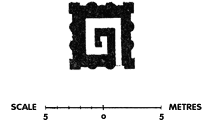
FIG. 47.—IRZÎ, TOWER TOMB.
|
|
cannot be seen from below. There are no traces of houses, nor any means of obtaining water from the river, nor any cisterns for the storage of rain. Balbi's city is a city of the dead; it is the necropolis of a town that stood, presumably, in the irrigated country below. The towers were all alike (Fig. 47). They are built of irregular slabs of stone, the shining gypsum of which the hill is formed, laid in beds of mortar. Each tower rests upon a square substructure, about 1'70 m. high; in this substructure are the tombs, hollowed out of the solid masonry, irregular in number and in position. In the best preserved of the towers I could see but one tunnel-like grave opening on the west side (Fig. 48), while there were two or three to the north and east. The tombs are covered by a small vault made of two stones leaning against one another. Above the substructure the walls are broken by corner piers of small projection, with two engaged columns between them. The columns are crowned by capitals made of a single projecting slab, above which a slightly projecting band of plaster forms an entabla- / p.84 / ture. Then follows a plain piece of wall about a metre high upon which stands an upper order of engaged columns, half as large as those below, so that there was place for five between the corner piers, if these were repeated on the upper part of the tower. A door between the corner pier and one of the engaged columns opens on to a winding stair which leads to the top of the tower. No rule was observed as to the direction of the compass in which the doors were placed. The towers cannot be as old as Xenophon's time; they are more likely to date from the first or second century of the Christian era; therefore the town to which they belonged must have been later than Corsote, and Corsote, it will be remembered, was deserted when he saw it. It is easy to understand that a city lying in the low ground might have been destroyed by inundations, and to imagine that a region so favourably situated for purposes of cultivation, and provided with an elaborate system of irrigation, should have been repopulated in a later age. And this is the explanation which I offer.1
---------------------------
1 With the doubtful contribution made by Ammianus Marcellinus to the question, I have dealt in the Appendix to this chapter.
---------------------------
The practice of burying the dead above "the common crofts, the vulgar thorpes," is still observed by the Arabs. All their graves lie loftily upon the nearest height, even if it should be only a mound by the river. From my camp I watched one of their funeral processions making its slow way from the village of Abu Kemâl towards some barren hills. Three or four miles the dead man was carried across the desert to find his resting-place among the graves of his ancestors, and no tribesman would have been content to lay him at the village gates, like a Turk or a town dweller. They carried him to the hills and so performed, as in the days of the Irzî city, their final service.
Fattûh and Selîm returned after nightfall, and reported the zaptieh problem to be still unsolved. Even at Abu Kemâl there was but one man, and we were forced once again to commandeer Mustafâ, who saw himself dragged further and
[ Illustrations opposite p.84 ]
FIG. 48.—IRZÎ, TOWER TOMB.
FIG. 49.—NAOURA OF 'AJMÎYEH.
[ Illustration opposite p.85 ]
FIG. 50.—THE INHABITANTS OF RAWÂ. (enlargement)
/ NINMALA p.85 / further from his home at Deir. We promised that he should return from Kâyim with 'Abdullah, the zaptieh from Abu Kemâl, and Mustafâ agreed with alacrity to this arrangement. All zaptiehs of my acquaintance enjoy travelling, with its contingent advantage of a regular daily fee from the effendi whom they escort. But neither he nor 'Abdullah knew the way along the left bank. "We have never heard of any one who wished to go by this road, wallah !" Moreover, they stood in considerable fear of the tribes whom we might encounter. I therefore engaged as guide 'Isâ, the affable, ragged person who had conducted me to Irzî, but since we were fully loaded with corn, we could not mount him and he marched smilingly for seven hours through a temperature of 83° in the shade. We rode over the Irzî bluffs and dropped by a steep and rocky path into the plain on the farther side, between the hills and the meandering river. To the right the village of Rabât, with a long stretch of corn, lay near the water's edge, and though our path lay only through tamarisk thickets, traces of numerous irrigation canals showed that the ground must once have been under cultivation. The plain is known as the Kâ'at ed Deleim, the land of the Deleim, and the tents of that tribe were to be seen on the banks of the Euphrates. It did not take me long to discover that we should reach Kâyim, or rather the point opposite to it, for it lies on the right bank, in about five hours from Werdî, and my heart sank to contemplate another long delay while we crossed and changed zaptiehs; therefore I refused to go down to the Euphrates and cut straight across a bend over high stony ground. So it happened that we never went near Kâyim, and the two kidnapped zaptiehs were embarked before they knew it on the road to 'Anah. We touched the river again seven hours from Werdî, where we found an encampment of the Jerâif, and since we were completely ignorant of what lay ahead, we pitched our tents there, opposite an island which Kiepert calls Ninmala. I found it almost impossible to get at any names for the numerous islands in these reaches of the Euphrates. The generic word for them is khawîjeh, and they bear no other title in the local speech. / p.86 / The Jerâif or Jerîfeh is a tribe which belongs properly to the right bank, but a few tents had come over on account of the terrible drought, there being always more pasture in the Jezîreh than in the Shâmîyeh. They are usually, so 'Isa explained, gôm to his tribe, the Bu Kemâl, but a truce had recently been patched up and he was received as hospitably as any of us.
There lies below 'Aˆnah and to the west of the Euphrates a region of desert through which few travellers have passed. The track of Chesney's journey of 1857 skirts it to the west; Thielmann crossed it nearly forty years later a little further to the east; Huber, following the Damascus post-road, touched its northern edge. So said Kiepert, and with this meagre information as a base I questioned that night the Arabs gathered round Fattûh's cooking fire as to the north-west corner of the Sasanian Empire. Among them was an aged man who had been to Nejd, in Central Arabia, and had brought back thence a bullet which was still lodged in his cheek; he knew that country, and if I would give him a horse he would take me to all the castles therein, Khubbâz, 'Amej, Themail, Kheidir. . . .
"Where is Kheidir ?" said I, for the name was unknown to me or to Kiepert.
"Beyond Shetâteh," answered a lean and ragged youth. "I too know it, wallah !"
"Is it large?" I asked.
"It is a castle," he replied vaguely, and one after another the men of the Jerâif chimed in with descriptions of the road. The sum total of the information offered by them seemed to be that water was scarce and raids frequent, but there were certainly castles; yes, in the land of Fahd Beg ibn Hudhdhâl, the great sheikh of the Amarât, there was Kheidir. I made a mental note of the name.
The region which we had now entered is particularly lawless. The government makes no attempt to control the Bedouin, and according to their custom they are occupied exclusively in raiding one another and in harrying the outlying property of the inhabitants of Rawâ, the town opposite / SHEIKH JID'NÂ p.87 / to 'Ânah. In addition to the depredations of the local tribes, the country is swept by armed bands of the Shammar from far away to the east, and of the Yezîdis, whom the Mohammadans call Devil Worshippers, from the Jebel Sinjâr. Accordingly when we asked for a guide, we were told that there was no one who would come with us alone, lest he should be attacked on his solitary return by blood enemies from half the world away. We took with us, therefore, two horsemen, 'Affân, of the sheikhly house, and Murawwah, the one armed with a rifle and the other with a rusty sword, and for the better part of the day we discussed the observance of blood feud. The old man with the bullet in his cheek, who was on his way to Baghdâd and proposed to travel with us as far as possible, served as an illustration of the text. It had a purely objective interest, for in spite of the fears exhibited by the Jerâif, there was very small risk of our meeting with a foe; the season for raiding is the summer, but the spring is a close time. 'Affân was eloquent in describing the long rides across the desert in the burning heat: "Lady, I have ridden four days with no water but what I could carry; that was when we bore off cattle and mules from the Jebel Sinjâr."
"Eh billah !" asseverated Murawwah, and felt for the hilt of his rusty sword.
We had not gone far before my mare shied out of the path and there swung up beside us a jovial personage mounted on a blood camel with his serving-man clinging behind him. He proved to be a sheikh of the Amarât, who are a branch of the 'Anazeh, and indeed he was own brother to Fahd ibn Hudhdhâl. His appearance suited his high birth. He was wrapped in a gold-bordered cloak, a fine silk kerchief was bound about his head, and his feet were shod with scarlet leather boots; he was tall and well liking, as are few but the great sheikhs among the half-fed Bedouin. He related to me the business which had brought him so far from his own people. One of the Jerâif had murdered a man of the Amarât, and the two tribes being on friendly terms. Sheikh Jid'ân (such was his name) had crossed the river to demand the summary execution of the murderer or the payment of / p.88 / blood money. He was hunting the man down through the Jerâif tents.
"Shall you find him ?" I asked.
"Eh wah !" he affirmed and laughed over his task.
Him too I questioned concerning Kheidir. "Go forward to 'Ânah," he said, "and there any man will take you to Kheidir. And if you come to my tents, welcome and kinship." So we parted.
In thirty-five minutes from the camp we passed the mound of Balîjah with Arab graves upon it; then for three hours we saw nothing of interest until we came to the mazâr of Sultan 'Abdullah, a small modern shrine. Somewhere near it are the ruins of Jabarîyeh, but they must lie closer to the mazâr than Kiepert would have them. I rode on looking for them for half-an-hour, and when I questioned 'Affân he replied: "Jebarîyeh ? It is under the mazâr. When you turned away I thought you did not wish to see those ruins." It was too hot to go back. We were now opposite Kal'at Râfidah, a splendid pile upon the right bank of the Euphrates, and here we left the caravan with Murawwah to guide it and followed the course of the river to Kal'at Bulâk, which the Arabs call Retâjah, an hour and a quarter's ride in blazing sun. We found there a small square fort with round towers at the angles, the whole built of sun-dried brick. Though it is in complete ruin, I believe it to be modern, probably a Turkish kishlâ, but I saw some fragments of stone and mortar building which are, at any rate, older than the mud fort, and the site is so magnificent that it can scarcely have been neglected in ancient times. The hill on which the ruins stand is all but converted into an island by an abrupt turn of the river, which washes the precipitous rock on three sides. The current is gradually undermining the high seat of Retâjah and the greater part of the older stone building has fallen into the stream. We had a hard gallop to catch up the caravan, and a long pull over rocky ground before we sighted the river again, flowing in wide and tranquil curves under the sunset. On either side the banks were lined with naouras, the Persian water-wheels. The quiet air was full of the rumble and / 'AJMÎYEH p.89 / grumble of them, a pleasant sound telling of green fields and clover pastures, but there were no villages or any other sign of man. As I looked, I knew that we had passed over an unseen frontier; whether the geographers admitted it or no, this was Babylonia.
We rode down wearily to the first naoura and there threw ourselves from our horses. The river turned the wheel, the wheel lifted the water, the water raced down the conduit and spread itself out over a patch of corn and round the roots of a solitary palm-tree, and all happened as if it were a part of the processes of nature, like the springing of the palm tree and the swelling of the ears of corn. But it was nature in leading-strings, and the lords of creation, in a very unassuming guise, surged up from a hole in the ground roofed with palm fronds and bade us welcome to their domain — two men and a little boy who watched over the crops on behalf of a Rawâ merchant. The place has a name, 'Ajmîyeh, and a history, if only I could have deciphered it in the cut stones and fragments of wall which the river slowly washed bare and then washed away. But the immediate present was of greater importance. Before the moon was up, supper was spread by the naoura, and the watchmen, the boy, the Arabs and the old man with the bullet were sharing with my servants and zaptiehs an ample meal of rice. We had marched ten hours.
In the morning I saw that quantities of pottery were washed out of the bank together with the stones. Much of it was glazed with black upon the inside, some was the usual coloured Mohammadan stuff and there were pieces of the big pointed jars, unglazed, which belong to every age. Beyond the corn lay masses of similar potsherds; the river bank must once have been strewn with small villages. When we had ridden for half-an-hour we met three horsemen of the Jerâif, and 'Affân declared that he would return with them to his tents, and as for Murawwah he might cross with us to 'Ânah and go home along the right bank. I had no objection to raise, and as Murawwah did not demur to the scheme 'Affân was allowed to leave us. Murawwah was a small man / p.90 / and a lean, mounted on a half-starved mare, himself half starved, with naked feet, a ragged cotton cloak thrown over his head to protect him from the sun, and a rusty sword by his side to defend him from his enemies. We had struck up a wordless friendship and now that 'Affân was gone we fell into talk. I asked him whether he had heard of liberty.
"Eh wah !" he answered, "but we know not what it means."
"It means to obey a just law," said I, seeking for some didactic definition. But Murawwah knew nothing of obedience nor yet of just rule.
The zaptieh 'Abdullah took up my word. "Oh Murawwah," said he, "when there is liberty in this land, there will be no raiding and the Arabs will serve as soldiers."
"No wallah!" returned Murawwah firmly.
'Abdullah laughed. "Slowly, slowly," he said, "the government will lay hands on the desert, and the Arabs will be brought in, for they are all thieves."
Murawwah drew himself up on his hungry mare. "Thieves !" he cried. "Thieves are dogs. How can you compare the Arabs with them? We will not bow our heads to any government. To the Arabs belongs command." And he slashed the air defiantly with his tamarisk switch as he proclaimed the liberties of the wilderness, the right of feud, the right of raid, the right of revenge — the only liberty the desert knows.
Three hours and a half from 'Ajmîyeh we stopped at a naoura, Natârîyeh, to water our horses, and just beyond it we were overtaken by half-a-dozen angry men from Rawâ, mounted and carrying rifles. The cause of their ride and of their anger they were not slow to make known to us. The watchman at their naoura had sent in word to Rawâ that the Deleim had come down and were pasturing their mares in the corn. "And we went to the Kâimmakâm and asked for soldiers to drive them off, and the Kâimmakâm answered, 'Go ask the Vâlî of Baghdâd, for I have none.' As God is exalted! there were but two soldiers in the kishlâ of Rawâ. And we took our rifles and mounted our mares and rode out
/ NATÂRIYEH p.91 / alone, and all last night we hunted them through the desert until we were so far from the river that we dared not go on. We are six men, look you, and the Deleim are counted by thousands. So we returned, and a curse upon the government that cannot protect our property, and may all Arabs burn in hell!"
At this point one of them perceived Murawwah, who was riding in discreet silence by my side. "Listen, you! dog son of a dog," he cried. "We lay out our capital and you take the interest; we sow and you gather the harvest, yes, without reaping, and we may starve that you and your accursed brothers may fatten. I have a mind to take you as hostage to Rawâ and hold you till we get our due." Murawwah, though for a free child of the desert he was unfortunately placed between zaptiehs and angry citizens, was not alarmed by the threat. We had changed parts as soon as we neared civilization, and he now edged nearer to me, knowing that he was safe under my protection, but for which he would not have ventured into Rawâ where there were too many reckonings scored up against the tribes.
We were not to escape without ourselves taking a lesson in the elements of raiding. Half-an-hour or so from Natârîyeh, Jûsef came riding up from the caravan, which was behind us, to ask if we had seen anything of the donkey, the unrivalled donkey purchased in Aleppo, and to our consternation we discovered that he was missing. There had been a few Arabs at Natârîyeh, and while we were engaged in watering the baggage animals, the donkey had strayed away to make acquaintance with some low-born Bedouin donkeys and had remained behind. Fattûh and 'Abdullah rode back and speedily found him (he was twice the size of the others), but his pack saddle and other trappings were gone. Thereupon Fattûh, like the merchants of Rawâ, took the law into his own hands, drove off an Arab donkey together with our own, and declared that unless the Arabs restored our property to us that night at 'Ânah he would sell theirs in the open market and keep the money. Thus it was that we turned raiders like every one else who lives in the desert. Fattûh caught me up / p.92 / two and a half hours later opposite the island of Karâbileh, where I had stopped to lunch, and we sent Murawwah back to reclaim the pack saddle, bidding him join us at 'Aˆnah. He was exceedingly loth to obey this order, saying that he dared not enter 'Aˆnah alone, and I never expected to see him again, in spite of the fact that he had not received his bakhshîsh. In another twenty minutes we were riding through the fruit gardens and palm groves of Rawâ — the fruit-trees were all in flower, a delectable sight for travellers in the wilderness. While the ferry-boats were being brought up I climbed the hill to the modern citadel (Rawâ, so far as I am aware, has no ancient history) and thence looked down upon the long thin line of 'Ânah, houses and palm-trees folded between the hills and the river, and afar the island that was ancient Anatho, floating upon the broad waters. The population of Rawâ swarmed up the hill after me, watching my every movement with strained attention, and before we were fairly embarked I registered a vow that no caravan of mine should ever again pass through the town, so exasperating it is to find two hundred people in your path whichever way you would turn (Fig. 50). When once we had crossed the river we fell into a merciful obscurity; the post-road runs through 'Ânah, and it matters not a para to anybody but the khânjî whether one European more or less comes down it. The khânjî, a friend of Fattûh's, was unfeignedly glad to see us, and his khân looked good, but better still the patch of ground behind that stretched down to the water's edge. Here with the consent of mine host we pitched our tents, in full view of an exquisite little island, green with corn and shaded by palm-trees; and whatever love you bear the desert there can be no doubt that green growing things are pleasant to the eye, and that the spirit rests comfortably upon the assurance that a good dinner, not tinned curry, will shortly be forthcoming. Just as it was ready, behold Murawwah, obedient to the call of hunger — minus his sword indeed, for he had left it in pawn to the ferryman, but bringing with him the owner of the donkey we stole, together with the goods that had been stolen from us. And every one came to his own again. But / 'ÂNAH p.93 / the episode has never faded from Fattûh's memory, and in the hour of reminiscence he is wont to say, "Your Excellency remembers how we raided the Arabs? May God be exalted! We have travelled much in the desert, and the only raid we ever saw was one of our own making."
There was another arrival at our camp that night. Late in the evening Jûsef inquired whether I would receive a soldier, and thinking it was to-morrow's zaptieh, I consented. A grizzled man appeared at the tent door and sat down on his heels.
"Peace be upon you," said he.
"And upon you peace," I answered.
"Effendim," he said, "I am a man advancing in years." He made the gesture of one who strokes a venerable beard, although his chin was bare. "And for long I have prayed for a son. Praise be to God, this night God has granted my request."
"Praise be to God," said I.
"God give you the reward," he rejoined. "Effendim, in honour of this exceptional occasion, will you kindly help with the expenses?"
Now it happened somewhere about the year 1300 B.C. that Hattusil, King of the Hittites, wrote to the King of Babylon, and among other matters of international interest, he observed that the reason for the interruption of diplomatic relations with the court of Babylonia was the uncertainty of travel caused by the movements of the Bedouin. No other consideration, he said, should have prevented him from dispatching his ambassador to the son of so excellent a father. The conditions described in Hattusil's letter hold good until to-day. The Bedouin are still masters of the desert road, and established order is helpless before the lawless independence of the tribes. The truth is that nomad life and civilization are incompatible terms: the peaceful cultivator and the merchant cannot exist side by side with the sheikh, and either the settled population must drive the Bedouin from out their borders, or the Bedouin will put progress and the accumulation of wealth beyond the power of the most industrious. Until we drew
/ p.94 / near to 'Ânah, our road had led us through regions which the Arabs hold in undisturbed possession. No caravans pass down the east bank of the Euphrates; no towns are built there; save for the spasmodic labours of the half settled tribes, no fields are cultivated. But with the first naoura of the Rawâ townsmen the conditions were altered, and when we crossed the river we plunged into the struggle that has been waged for all time between the nomad and the State. For four days we followed the high road to Baghdâd — unwillingly enough, since I was ever looking for a door into the Syrian desert — and I had opportunity to study the oldest problem of government.
The town of 'Aˆnah has been lengthening steadily ever since the sixteenth century, for Rauwolff says that it is one hour long, and della Valle two, and I know that it is three. But it was and remains a single street wide, a Babylonish mud-built thoroughfare, green with palms, murmurous with naouras and lapped by the swift current of the Euphrates (Fig. 51). From the hilltop of Rawâ I had already caught sight of the only vestiges of antiquity that 'Ânah can boast, the ruined castle and tall minaret upon the island of Lubbâd at the lower end of the town. Here stood the fortress which, "like many others in that country, is surrounded by the Euphrates."1
---------------------------
1 Amm. Mar., Bk. XXIV. ch. i. 6.
---------------------------
Julian, seeing the difficulties of a siege, came to terms with the inhabitants, who surrendered to him and were treated with all kindness. But the fortress he burnt. I was determined not to leave 'Ânah without visiting the island, and having settled with Fattûh the length of the day's march, I left him to buy provisions and load the caravan, and rode down to a ferry opposite the island. The boat was commonly used to transport stones from the castle, and when we arrived it was in course of being loaded on the other side. Much shouting at length attracted the attention of the ferryman, and we went into a neighbouring coffee-house to await his coming. A party of citizens had gathered together over the morning cup; we joined the circle and shared in the coffee and the
[ Illustration opposite p.94 ]
FIG. 51.—'ÂNAH FROM THE ISLAND OF LUBBÂD. (enlargement)
[ Illustrations opposite p.95 ]
FIG. 52.—'ÂNAH, A FISHERMAN.
FIG. 53.—HÎT, PITCH-SPRING.;
/ 'ÂNAH p.95 / talk. The men in the coffee-house entertained no hope that the constitutional or any other government would succeed in establishing order.
"Ever since the days of the Benî Ghassân," said one (and I could have added "ever since the days of the Hittites"), "the Arabs have ravaged the land, and who shall stop them? The government does nothing and we can do nothing. We have no power and all of us are poor."
"In the last six years," said another, "we have had fourteen Kâimmakâms at 'Ânah. Not one of these gave a thought to the prosperity of the town, but he extorted what money he could before he was removed."
"There is a new Kâimmakâm on his way here," I observed.
"True," he replied. "When the telegram came last summer telling of liberty and equality, the people assembled before the serâyah, the government house, and bade the Kâimmakâm begone, for they would govern themselves. Thereat came orders from Baghdâd that the people must be dispersed; and the soldiers fired upon them, killing six men. And we do not know what the telegram about liberty and brotherhood can have meant, but at least the Kâimmakâm was dismissed."
My zaptieh broke in here. "Effendim," said he, "it fell out once that I was in Bombay — yes, I was sent from Basrah with horses for one of the kings of India. And there I saw a poor man whose passport had been stolen from him, and he carried his complaint to the judge. Now the judge was of the English, and he fined the thief and cut off two of his fingers. That is government; in India the poor are protected."
"Allah!" said one of the coffee-drinkers in undisguised admiration.
I knew better than to question the validity of the anecdote, and, with what modesty I could assume, I accepted the credit that accrued from it.
"But even the English," pursued another, "cannot hold the tribes. Effendim, have the Afghans submitted to you? Wallah, no."
He had laid his finger upon a knotty point, and I took up the question from a different side.
/ p.96 /
"Have not you men of 'Ânah sent a deputy to the mejlis?" I asked.
"Eh wallah!" they answered.
"Let him make known in Constantinople the evils under which you suffer, that the government may seek for a remedy."
The suggestion was received in silent perplexity.
"For what purpose did you pay the deputy to go to Stambûl?" I pursued.
"The order came," replied one of my interlocutors. "We do not know why the deputy was sent. Doubtless he has his own business in Stambûl and he is not concerned with 'Ânah."
"His business is yours," I said; "and if he will not see to it, at the next election you must choose a better man."
"Will there be another election?" said they, and I found all 'Ânah to be under the impression that their representative held a life appointment.
The island is a little paradise of fruit-trees, palms and corn, in the middle of which is a village of some thirty houses built in the heaped-up ruins of the castle. From among the houses springs a tall and beautiful minaret, octagonal in plan (Fig. 56). Its height is broken by eight rows of niches, each face of the octagon bearing in alternate storeys a double and single niche, all terminating in the cusped arch which is employed at Rakkah. Some of the niches are pierced with windows to light the winding stair. The tower rises yet another two storeys, but the upper part is of narrower diameter, and the windows and niches are covered with plain round arches. At the northern end of the island the walls and round bastions of the fortress stand in part, but they are not very ancient. Ibn Khurdâdhbeh, who is the first of the Mohammadan geographers to mention 'Ânah, says only that it is a small town on an island;1
---------------------------
1 Ed. de Goeje, p. 233
---------------------------
in Abu'l Fidâ's time it was still confined to the island;2
---------------------------
2 Ed. Reinaud, p. 286.
---------------------------
Rauwolff (1564) notices the town on the island / LUBBÂD p.97 / and the town on the right bank;1
---------------------------
1 Quoted by Ritter, Vol. XI. p. 717.
---------------------------
Yâkût (1225) speaks of the castle, but the walls which I saw cannot be as old as his day. The minaret may belong to a different period, and de Beylié places it in the earliest centuries of Islâm.2
---------------------------
2 De Beylié : Prome et Samarra, p. 68. See, too, Viollet's memoir presented to the Acad. des Inscrip. et B.-Lettres, quoted above. He, too, was shown the fragment of Assyrian relief and gives an illustration of it, for which reason I do not trouble to publish my photograph.
---------------------------
I think that there was probably a fortress on the island long before the first written record which has come down to us, but I was close upon a generation too late to see the remains of it. From two informants in 'Ânah I heard that there had been big stone slabs at the northern end of the island "with figures of men upon them and a writing like nails," but they had fallen into the water within the memory of the older inhabitants and had been washed away or covered by the stream. This tale of cuneiform inscriptions would not in itself be worth much, but while I was examining the minaret, a villager brought me a fragment of stone covered with carving in relief which was unmistakably Assyrian. I asked him whence it came, and he replied that it had formed part of a big stone picture which had fallen into the river. I bought from him a broken bowl inscribed with Jewish incantations of the well-known type.3
---------------------------
3 Pognon : Inscriptions mandaites des coupes de Khouabir.
---------------------------
The island was once connected with both banks by bridges. There are some traces of the section that led across to the Jezîreh, and many piers of the Shâmîyeh bridge stand in the river. Though these piers no longer serve the purpose for which they were intended, they are still put to use, for the inhabitants of the island spread nets between them, and the fish swimming down with the current are entangled in the meshes and so caught (Fig. 52). We pulled up one of the nets as we passed, and it produced two large fish which I bought for a few pence. It is curious that the Bedouin neglect the ample supply of food with which the river would furnish them; in spite of frequent inquiries we had never found fish in their tents.
Just below the houses of 'Ânah on the Shâmîyeh bank / p.98 / there were mounds by the river from which, said my zaptieh, the people get antîcas after rain, and sometimes small gold ornaments are washed out of them. On the opposite bank I could see ruins for a distance of an hour's ride from 'Ânah; they ended at a big mound called Tell Abu Thor, which appeared to be a natural outcrop of the rock, though there were many small, seemingly artificial, mounds about it.1
---------------------------
1 Chesney notices that the ruins of the old town lie on the left bank below the present 'Ânah. Quoted by Ritter, Vol. XI. p. 724.
---------------------------
An hour and a half from 'Ânah we passed another rocky hill, also called Tell Abu Thor, but I could see no traces of ruins round it. From the summit of the tell there was a fine view of the little fortified island of Tilbês, the island castle of Thilutha, whose inhabitants refused to surrender to Julian. I could see the bastions of masonry on the upper end of the island, together with the ruins of a castle on the Jezîreh bank, and if there had been any possibility of crossing the river I should have gone down to it; but there was no ferry nearer than 'Ânah. I did not follow the winding course of the Euphrates from 'Ânah to Hît. Many of the ruins marked in Chesney's map deserve a careful survey, but my mind was now set upon another matter, and we rode on from stage to stage hoping each day that the next would provide us with a guide into the western desert. My zaptieh, Muhammad, lent a sympathetic ear to the scheme which I developed to him as we rode. The arm of the law, weak enough on the Euphrates, does not reach into the wilderness, and his duties had taken him but a little way west of the road; the main difficulty to be encountered was the lack of water, a difficulty much enhanced by the drought.
"God send us rain!" he sighed. "Effendim, at this time of the year I am used to stay my mare at such places as these" (he pointed to the hollows in the barren ground), "and while I smoke a cigarette she will have eaten her fill of grass. But this year there is no spring herbage, and in the season of the rains, forty days have passed without rain. All the waterpools in the Shâmîyeh are exhausted, and the Arabs are / FHEMEH p.99 / crossing to the Jezîreh lest they die, for their flocks can give no milk."
Presently we met a train of thirsty immigrants driving their goats to the Euphrates. Muhammad called to them and asked if they would give us a cup of leben, sour milk. A half-starved girl shouted back in answer:
"If we had leben we should not be crossing to the Jezîreh."
"God help you!" cried Muhammad. "Cross in the peace of God."
A little further we passed through a number of newly-made graves, scattered thickly on either side of the road. "They are graves of the Deleim," said Muhammad. "A year ago a bitter quarrel arose within the tribe, and here they fought together and seventy men were slain. They buried them where they fell, the one party on one side of the road, and the other on the other side."
We travelled fast and in five hours from 'Ânah came down to the river at Fhemeh, where we found our tents pitched near a kishlâ. The guardhouse is the only building here, the village of Fhemeh being in the Jezîreh about half-an-hour up stream. About the same distance lower down lies the island of Kuro, which is perhaps Julian's Akhaya Kala, but I saw it only from afar and do not know whether there are still ruins upon it. We had parted at 'Ânah from Cyrus and from Julian; they marched with their armies down the Jezîreh bank, and our road lost much of its charm in losing the shadowy pageants of their advance.
We were tormented during the next three days by an intolerable east wind. It blew from sunrise to sunset, and, for aught we could tell, it might have issued from the mouth of a furnace, so scorching was its dust-laden breath. I heard of ruins at Sûs, a place where the Jerâif own cornfields; but it lay at the head of a peninsula formed by a great bend of the stream, and I had no heart to go so far out of the way.1
---------------------------
1 It is, I suppose, Chesney's Sarifah, which has been conjectured to be the Kolosina of Ptolemy : Ritter, Vol. XI. p. 730.
---------------------------
We reached Hadîthah in six hours from / p.100 / Fhemeh and camped there, partly because we were weary of the wind and dust, and partly because Muhammad had advised me to seek there for a guide into the desert. The nearer we came to that adventure, the more formidable did it appear, and I was beginning to realize that it would be folly to take a caravan across the parched and stony waste, and to revolve plans for sending the muleteers to Kerbelâ and taking only Fattûh with me to Kheidir. At Hadîthah we met an aged corporal, who declared that nothing would be easier than to go straight thence to Kasr 'Amej, and for water we should find every night a pool of winter rain. He had crossed the desert two years ago and there had been no lack of water.
"But this year there has been no rain," I objected; "and all the Arabs are coming down to the river because of the great drought. Where, then, shall we find the pools?"
"God knows," he answered piously, and I put an end to the discussion and turned my attention to the ruins of Hadîthah.
The village, like all the villages in these parts, lies mainly upon an island, though a small modern suburb has sprung up upon the right bank. At the upper end of the island are the ruins of a castle, not unlike the ruins at 'Ânah. A bridge had been thrown over both arms of the river, and a straight causeway across the island had connected the two parts. Needless to say, the bridge has fallen. Still more remarkable, and quite unexpected, was a large area of ruins some way inland on the Shâmîyeh side, hidden from the river village by a ridge of high ground. It must have been the site of a big town. In one place I saw four columns lying upon the ground, no doubt pre-Mohammadan, though upon one of them were four lines of a much-defaced Arabic inscription of which I could read only a few words.
1
---------------------------
1 These ruins give additional weight to Ritter's suggestion that Hadîthah was the Parthian station of Olabus : Vol. XI. p. 731. The Arab town of Hadîthah is first mentioned by Ibn Khurdâdhbeh, ed. de Goeje, p. 74.
---------------------------
Nearer to the river, and visible from it, are a number of small mazârs, remarkable only because their pointed dome-like roofs show the same construction that is to be seen in the famous tomb of the Sitt Zobeideh at Baghdâd.
/ 'UGLET HAURAN p.101 /
From 'Ânah the river landscape is exceedingly monotonous: a few naouras and a patch or two of cultivation, each with its farmhouse, a small domestic mud fortress with a tower; an occasional village set in a grove of palm-trees on an island in midstream. The houses were of sun-dried brick, the walls sloping slightly inwards, and crowned with a low mud battlement — line for line a copy of their prototypes on the Assyrian reliefs. This world, which was already sufficiently dreary, was rendered unspeakably hideous by the east wind. River, sky and mud-built houses showed the universal dun colour of the desert, and even the palm-trees turned a sickly hue, their fronds dishevelled by the blast and steeped in dust.
An hour and a half from Hadîthah we crossed the Wâdî Hajlân, in which there is a brackish spring. Just opposite its mouth are the remains of a castle on an island, Abu Sa'îd, but the greater part of the island, and with it the castle, has been carried away by the stream. Below it is the palm-covered island of Berwân. Twenty minutes further we passed over a dry valley, Wâdî Fâdîyeh, where I left the high road and crossed the desert to Alûs, which we reached in an hour and forty minutes. Kiepert, following Chesney, calls it Al' Uzz, but I doubt whether this spelling can be justified; the Arab geographers knew it as Alûs or Alûsah, and the name has not changed until this day. The village stands on an island, but there is also a ruined castle on the right bank of the river. We rode straight from Alûs to Jibbeh in two hours, though the zaptiehs reckon it three for a caravan. There was nothing to encourage us to loiter, inasmuch as our path lay over a horrible wilderness, stony, waterless and devoid of any growing thing. Rather more than half-way across we came to the 'Uglet Haurân, a valley which is said to have its source in the Haurân mountains south of Damascus. At the point where we crossed it, it was dry, but my zaptieh told me that there were springs higher up and that in wet years the water will flow down it from the Haurân to the Euphrates. The wind was so strong that I could not row over to the village which stands on the island of Jibbeh, / p.102 / though I was tempted by the tall round minaret that rises from among the palm-trees. As far as I could see through my glasses, it bears an inscription on its summit and a brick dog-tooth cornice. On the Jezîreh bank there is a large and well-preserved fortress. We reached the solitary khân of Baghdâdî a few minutes later; the caravan was there before us, having accomplished what is reckoned to be a nine-hours' stage in eight hours sixteen minutes. The village of Baghdâdî is an hour's march lower down, and the khân by which we camped was only four months old; "Before that," said Fattûh, "we used to sleep under the sky, and there was no one but us and the jackals." I had heard that Fadh Beg Ibn Hudhdhâl had a garden at Baghdâdî, and I cherished a hope that we might meet there one of his family who would help us on the way to Kheidir; but when we passed by the garden a solitary negro was in charge, and as the palms were not yet three feet high, I could not blame Fadh Beg for not having elected to dwell among them. There was nothing to be done but to ride on to Hît.1
---------------------------
1 Julian crossed the Euphrates at Parux Malkha, which cannot be far from Baghdâdî, and captured the castle of Diacira. This castle must have stood at the southern end of the great bend made by the Euphrates below Baghdâdî. Chesney saw the ruins of a fortress there. It is perhaps Ptolemy's Idicara and the Izannesopolis of Isidorus: Ritter, Vol. XI. p. 737.
---------------------------
From Baghdâdî the road climbs up into the barren hills. It is no better than a staircase cut out of the rock, and Fattûh admitted that carriage driving is not an easy matter here. He added that the stage from Baghdâdî to Hît is less secure than any other, by reason of its being infested by the Deleim who exact a toll from unguarded caravans. We had found two zaptiehs at the khân and had taken one on with us when we sent the Hadîthah man back, leaving the khân protected by a single zaptieh, so limited is the number of soldiers posted along the road. If you are not a person of sufficient consequence to claim an escort, you must wait until a body of travellers shall have collected at Baghdâd or Aleppo, as the case may be, and set forth in their company, since it is not / THE DELEIM p.103 / safe to venture singly over the Sultan's highroad. We met that morning a large caravan of people driving, riding in panniers, and walking. No matter what their degree, all wore the singularly abandoned aspect to which only the Oriental on a journey can attain, and the shapelessness of their baggage enhanced their personal disqualifications. About half-an-hour after the caravan had passed, we came upon five or six ragged peasants, who stopped us and lifted their voices in lamentation. They had been held up by five Deleimîs in the valley below; their cloaks had been taken from them, and the bread that was to have sufficed them till they reached 'Ânah: "We are poor men," they wailed. "God curse those who rob the poor!"
"God curse all the Deleim!" cried Fattûh. "Why did you linger behind the caravan in this part of the road?"
"We were weary and one of us had fallen lame," they explained. "But have a care when you reach the valley bottom; five men with rifles are lurking among the sandhills."
Their tale filled me with a futile anger, so that I desired nothing so much as to catch and punish the thieves, and without waiting to consider whether this lay within our power, I galloped on in the direction indicated by the peasants, with Fattûh, Jûsef and the zaptiehs at my heels. We were all armed and had nothing to fear from five robbers. The valley was a sandy depression with a sulphur stream running through it. We searched the sand-hills without success, but when we came down to the Euphrates, there were five armed men strolling unconcernedly along the bank as though they would take the air. Now, you do not wander with a rifle in your hand in unfrequented parts of the Euphrates' bank for any good purpose, and we were persuaded that these black-browed Arabs were the five we sought. Probably they had intended to reap a larger harvest, but finding the caravan too numerous they had contented themselves with the stragglers. Unfortunately we had no proof against them: the bread was eaten and the cloaks secreted among the stones, and though we spent some minutes in heaping curses upon them, we / p.104 / could take no steps of a more practical kind. The zaptieh, for his part, was in an agony of nervous anxiety lest we should propose to relieve them of their rifles. He looked forward to a return journey alone to Baghdâdî, and it is not good for a solitary man to have an outstanding quarrel with the Deleim. Finally I realized that we were wasting breath in useless bluster and called Fattûh away. If we were to concern ourselves with the catching of thieves, we might as well abandon all other pursuits in Turkey.
The town of Hît stands upon an ancient mound washed by the Euphrates (Fig. 54). Among the palm-trees at the river's edge rise columns of inky smoke from the primitive furnaces of the asphalt burners, for the place is surrounded by wells of bitumen, famous ever since the days when Babylon was a great city.1
---------------------------
1 Herodotus mentions the bitumen wells and calls the town Is. It has been identified with the Ihi of the Babylonian inscriptions, the Ahava of Ezra, and with the Ist from which a tribute of bitumen was brought to Thothmes III, according to an inscription at Karnak.
---------------------------
Heaps of rubbish and cinders strew the sulphur marshes to the north of the town, and a blinding dust-storm was stirring up the whole devil's cauldron when we arrived. It was impossible to camp and we took refuge in the khân, where we were so fortunate as to meet with an English traveller on his way back from India, the first European whom I had seen since we left Aleppo. The dust-storm rose yet higher towards evening, and though we closed the shutters of the khân — there was no glass in the windows — the sand blew in merrily through the chinks, and we ate a gritty supper in a temperature of ninety-three degrees.
Hît was the last possible starting-point for the Syrian desert, and no sooner had we arrived than I summoned Fattûh and presented him with an ultimatum. We had failed to get any but the most contradictory reports of wells upon the road to Kheidir and I would not expose the caravan to such uncertain chances, but if we went alone we could carry enough water for our needs. It only remained to dispatch
[ Illustrations opposite p.104 ]
FIG. 54.—HÎT. (enlargement)
FIG. 55.—HÎT, THE SULPHUR MARSHES. (enlargement)
[ Illustrations opposite p.105 ]
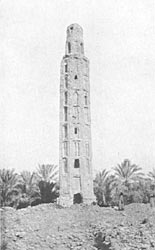
FIG. 56.—MINARET ON ISLAND OF
LUBBÂD.
|
|
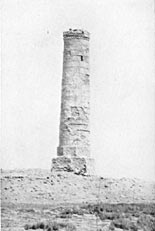
FIG. 57.—MINARET AT MA'MÛREH.
|
FIG. 59.—MADLÛBEH.
/ HÎT p.105 / the muleteers along the highway and to find a guide for ourselves.
"Upon my head!" said Fattûh blandly. "Three guides wish to accompany your Excellency."
"Praise be to God," said I. "Bid them enter."
"It would be well to see each separately," observed Fattûh, "for they do not love one another."
We interviewed them one by one, with an elaborate show of secrecy, and each in turn spent his time in warning us against the other two. Upon these negative credentials I had to come to a decision, and I made my choice feeling that I might as logically have tossed up a piastre. It fell upon a man of the Deleim, a tribe to whom we were not well disposed, but since the country through which we were to pass was mainly occupied by their tents, it seemed wiser to take a guide who claimed cousinship with their sheikhs. He was to find an escort of five armed horsemen and to bring us to Kheidir in return for a handsome reward, but we undertook to engage our own baggage camels. One of the drawbacks to this arrangement was that no camels were to be got at Hît, and I felt the more persuaded that we had struck a bad bargain when Nâif came back and said:
"How do I know that you will keep your word? Perhaps to-morrow you will choose another guide."
"The English have but one word," said I; it is a principle that should never be abandoned in the East. We struck hands upon it and Nâif left us "in the peace of God."
Fattûh needed a day to complete his preparations, and I to see the pitch wells of Hît which lie some distance from the town. I did not see them all, but from the accounts I heard they would appear to be five in number. The largest is called the Marj (the Meadow); it is an hour and a quarter north-east of Hît and is said to be inexhaustible. The pitch is better in quality here than elsewhere, and the peasants can, when they choose, get 2,000 donkey-loads from it daily. The next in importance is at Ma'mûreh, but it is not worked. The pitch flows out over the desert and dries into an asphalt pavement / p.106 / about half-a-mile square. Further south is a small spring, Lteif, from which they get twenty loads a day, and near the town there is a fourth well which yields fifty loads a day (Fig. 53). The fifth well is on the other side of the Euphrates, at 'Atâ'ut; the average yield from it is twenty loads a day.
Near the asphalt beds of Ma'mûreh, about an hour southwest of Hît, lie the ruins of a village clustered round a minaret (Fig. 57). All the buildings were constructed of small unsquared stones set in mortar; the minaret was plastered on the outside and seemed to have been built of large blocks of stone and mortar, firmly welded together before they had been placed in position. The round tower, narrowing upwards and decorated at the top with a zigzag ornament, was placed upon a low octagonal structure which
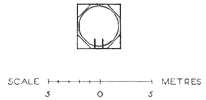
FIG. 58.—MA'MÛREH, MINARET
|
|
in turn rested upon a square base (Fig. 58). I climbed the winding stair that I might survey the country through which Nâif was to take us. It was incredibly desolate, empty of tent or village save where to the west the palm-groves of Kebeisah made a black splash upon the glaring earth. The heavy smoke of the pitch fires hung round Hît, and the sulphur marshes shone leprous under the sun — a malignant landscape that could not be redeemed by the little shrines which were scattered like propitiatory invocations among the gleaming salts.
About a mile from Ma'mûreh there is a still more remarkable ruin known as Madlûbeh. It is a large, irregularly shaped area marked off from the desert by heaps of stones half buried in sand. Standing among these heaps, and no doubt in their original position, there are a number of large monolithic slabs placed as if they were intended to form a wall (Fig. 59). Many of these must have fallen and been covered with the sand if the enclosure were at any time continuous, and perhaps the heaps are composed partly of buried slabs. / HIT p.107 / Two stand in line with a narrow space between like a door (one of them was 5 m. long x 1'3 m. thick, and it stood 2 m. out of the ground); in another there was a small rectangular cutting that suggested a window-hole on the upper edge (it was 10 m. long x 1'3 m. thick, and stood about 3 m. out of the ground). The stones were carefully dressed on all sides. They may have formed the lower part of a wall of which the upper part was of sun-dried brick or rubble, but at what age they were placed in those wilds a cursory survey would not reveal.
When I returned to the khân, Fattûh greeted me with the intelligence that the Deleimî had broken his engagement. Nâif admitted that for ordinary risks the money we had offered would have been sufficient, but Kheidir lay in the land of his blood enemies, the Benî Hassan, and he would not go. Perhaps he hoped to force us to a more liberal proposal, but in this he was disappointed. A bargain is a bargain, and we fell back upon my boast that the English have but one word. In this dilemma Fattûh suggested that he should see what could be done with the Mudîr, and having a lively confidence in Fattûh's diplomacy, I entrusted him with my passports and papers, of which I kept a varied store, and gave him plenipotentiary powers. He returned triumphant.
"Effendim," said he, "that Mudîr is a man." This is ever the highest praise that Fattûh can bestow, and my experience does not lead me to cavil at it. "When he had read your buyuruldehs he laid them upon his forehead and said, 'It is my duty to do all that the effendi wishes.' I told him," interpolated Fattûh, "that you were a consul in your own country. He will give you a zaptieh to take you to Kebeisah, and if you command, the zaptieh shall go with you to Kal'at Khubbâz, returning afterwards to Hît. And it cannot be that we shall fail to find a guide and camels at Kebeisah, which is a palm-grove in the desert; for all the dwellers in it know the way to Kheidir. As for the caravan, another zaptieh will take it to Baghdâd."
"Aferîn!" said I. "There is none like you, oh Fattûh."
"God forbid!" replied Fattûh modestly. "And now," he / p.108 / proceeded, "let me bring your Excellency an omelet, for I am sure that you must be hungry." But I understood this exaggerated solicitude to be no more than a covert slur upon the culinary powers of Mr. X.'s servant, who had provided us with an abundant lunch during Fattûh's absence, and not even so voracious a consul as I could face a second meal. Fattûh retired in some displeasure to inform the muleteers that they would journey to Baghdâd and Kerbelâ and there rejoin us, please God.
We explored the village of Hît before nightfall, and a more malodorous little dirty spot I hope I may never see. "Why," says the poet, concerning some unknown wayfarer, "did he not halt that night at Hît?" and it is strange that Ibn Khurdâdhbeh, who quotes the question, should have been at a loss for the answer. Possibly he had no personal knowledge of Hît. On the top of the hill there is a round minaret, similar in construction to the minaret of Ma'mûreh, but I saw no other feature of interest. The sun was setting as we came down to the palm-groves by the river. The fires under the troughs of molten bitumen sent up their black smoke columns between the trees (Fig. 60); half-naked Arabs fed the flames with the same bitumen, and the Euphrates bore along the product of their labours as it had done for the Babylonians before them. So it must have looked, this strange factory under the palm-trees, for the last 5,000 years, and all the generations of Hît have not altered by a shade the processes taught them by their first forefathers.
THE PARTHIAN STATIONS OF ISIDORUS
OF CHARAX
THE only modern record of the road along the left bank of the Euphrates from Rakkah to Deir is the rather meagre account given by Sachau; Moritz travelled down the left bank from Deir to Buseirah, but I know of no published description of the road from Buseirah to 'Ânah. It has not
[ Illustrations opposite p.108 ]
FIG. 60.—HÎT, THE BITUMEN FURNACES.
FIG. 61.—THE EUPHRATES AT HÎT.
[ Illustrations opposite p.109 ]
FIG. 62.—THE WELL AT KEBEISAH.
FIG. 63.—'AIN ZA'ZU.
/ PARTHIAN STATIONS p.109 / therefore been possible hitherto to attempt to place in any continuous sequence the sites given by ancient authorities. Of these the fullest list is that of the Parthian stations furnished by Isidorus of Charax (Geographi Graeci Minores, ed. by Müller, Vol. I. p. 244). It begins with the fixed point of Nicephorium (Rakkah) and ends with another fixed point that of Anatho ('Ânah). Between these two lies Nabagath on the Aburas. The Aburas may safely be assumed to indicate the Khâbûr, and Nabagath is therefore Circesium-Buseirah. The following comparative table shows my suggestions for the remaining stations, combined with those which have already been made by Ritter and others. The times given are the rate of travel of my caravan; between Rakkah and Deir I had the advantage of comparing them with Sachau's time-table. No two caravans travel over any given distance at exactly the same pace, but the general average works out without any grave discrepancy. I have often tried to reckon the speed at which my caravan travels and have come to the conclusion that it is very little under three miles an hour, say about two and seven-eighths miles an hour. Isidorus computes his distances by the schoenus. According to Moritz 1 schoenus = 5'5 kilometres. From Buseirah to 'Ânah I travelled over Isidorus's road at the rate of 1 schoenus in 1 hr. 7 min., which would bring the schoenus down to 5'166 kilometres. The section from Rakkah to Buseirah is not so easy to calculate because Isidorus has in two places omitted to give the exact distance between the stations, but my rate of travel was not far different here from that noted in the other sections. So much for the average. The individual distances do not tally so exactly, and in attempting to determine the sites, the evidence that can be gathered from the country itself seems to me to weigh heavier in the scale than the measurements given by Isidorus, especially as his inexactitude is proved by the fact that the sum of the distances he allows from station to station do not coincide with the total distances, from the Zeugma (Birejik) to Seleucia, and from Phaliga to Seleucia, as he states them. In both cases the sum of the small / p.110 / distances comes to a larger figure than that which he allows for the totals —
Zeugma to Seleucia . . . . 171 sch.
total of distances between stations 174 sch., without the two omitted by him.
Phaliga to Seleucia . . . . 100 sch.
total of distances between stations 120 sch. without one omitted by him.
As regards the second section, Kiepert believed that a copyist's error of 10 sch. too much had been made in Isidorus's table between Izannesopolis and Aeipolis (the modern Hît), but even this correction will not bring the totals together (Ritter, Vol. XI. p. 738). The road from the Zeugma to Nicephorium does not follow the river, and I am therefore unable to control the statements of Isidorus above Rakkah; nor do I know the section between Hît and Seleucia. I need scarcely say that my table is of the most tentative character; it begins with the ninth station of Isidorus, Nicephorium.
The first remarkable site which I saw on the river below Rakkah was the large area surrounded by a ditch, half-an-hour above my camping-ground. Isidorus's tenth station from Zeugma is Galabatha. Ritter (Vol. XI. p. 687) observes that it must be above Abu Sa'îd, and the area enclosed by the ditch fulfils that condition. The eleventh station is Khubana which I put at Abu Sa'îd, where there are fragments of columns and other evidences of antiquity. The twelfth station is Thillada Mirrhada; I have placed it at Khmeidah (squared stones, brick walls, a broken sarcophagus), but the claims of Abu 'Atîk are considerable, the extent of the ruin field at the latter place being much larger than at Khmeidah. But Abu 'Atîk is 7 hrs. 5 min. from Abu Sa'îd, and the caravan time between Khmeidah and Abu Sa'îd (6 hrs. 5 min.) is already rather long for the 4 sch. allowed by Isidorus. The thirteenth station is Basilia with Semiramidis Fossa. Ritter long ago pointed to the probability of its having been situated at Zelebîyeh (Vol. XI.
/ PARTHIAN STATIONS p.111 /

[TABLE]
/ p.112 /
p. 687). Semiramidis Fossa was no doubt a canal; Chesney saw traces of an ancient canal below Zelebîyeh. The distance from Thillada to Basilia is not given by Isidorus. Ritter would allow 5 sch. and Herzfeld 7 sch. (Memnon, 1907, p. 92); according to my reckoning both these distances are too long. I marched from Khmeidah to Zelebîyeh in 3 hrs. 40 min., which implies a distance of not more than 3 sch. For the fourteenth station, Allan, Umm Rejeibah is the only possible site I saw. It is true that I reached it in 3 hrs. from Zelebîyeh, whereas Isidorus puts it 4 sch. from Basilia, but I cut straight across the hills, and if I had followed the river (i. e. from the mouth of the canal, Semiramidis Fossa) the time needed would have been considerably longer. The fifteenth station, Biunan, was conjectured by Ritter to lie opposite Deir. I saw no traces of ruins upon the left bank, though Sachau speaks of the remains of two bridges (Reise, p. 262), and I shoud be more inclined to look for Biunan at a nameless site mentioned by Moritz (op. cit., p. 36). The difference is not in any case of importance, for the site seen by Moritz is immediately below Deir. He would have it to be Phaliga, which is doubtless Pliny's Phaliscum, but that suggestion is difficult to reconcile with Isidorus's 14 sch. from Basilia to Phaliga, which brings Phaliga much nearer to Circesium. Moreover, Isidorus states that Nabagath is near Phaliga — so near that he does not trouble to give any other indication of the distance between the two stations — and as Nabagath on the Aburas cannot be other than Buseirah, Phaliga too must be close to the Khâbûr mouth. I did not see the site mentioned by Moritz because I neglected to follow the river closely immediately below Deir; if it be, as I suppose, Biunan, I cannot attempt to identify the site of Phaliga. The seventeenth station, Nabagath, is, as has been said, Circesium-Karkîsîyâ-Buseirah. The eighteenth, Asikha, I would identify with the Zeitha of Ptolemy and Ammianus Marcellinus, and with the mounds I saw at Jemmah. For the nineteenth station, Dura, I know no other site than the very striking tell of Abu'l Hassan, the biggest mound upon / PARTHIAN STATIONS p.113 / this part of the river. Müller has suggested that the mound may represent Ptolemy's Thelda (in his edition of Ptolemy's Geography, p. 1003). Ammianus Marcellinus also mentions "a deserted town on the river" called Dura. The army of Julian reached it in two days' march from Zeitha, at which place the emperor had made an oration to his soldiers after sacrificing at Gordian's tomb. Now two days' march from Zeitha-Jemmah would bring the army to Werdî-Irzî, which is no doubt the place called by Xenophon Corsote and described by him as "a large deserted city." It is perhaps worthy of observation that, in spite of its being deserted, Cyrus provisioned his army at Corsote and that Julian's army found at Dura, though it too was deserted, "quantities of wild deer, so that the soldiers and sailors had plenty of food." My own impression on the spot was that Ammianus Marcellinus's Dura must be Irzî. The tower tombs were certainly erected before the middle of the fourth century, therefore they were in existence when Julian passed; moreover, they were far more numeorus and conspicuous than they are at present, since almost all of them have now fallen into ruin. It is difficult to see how Irzî could have failed to attract the attention of Ammianus Marcellinus, and Dura is the one place mentioned by him between Zeitha and 'Ânah. But the Dura of Isidorus, the nineteenth station, has to be placed at Abu'l Hassan, not at Irzî, since his twentieth station, Merrhan, necessarily falls at Irzî, and I can only conjecture that, as in Julian's time both places were ruined and deserted, Ammianus Marcellinus made a confusion between them, or was wrongly informed, and transferred the name of Dura (Abu'l Hassan) to Merrhan (Irzî). For the twenty-first station, Giddan, I can offer no suggestion. Jabarîyeh will scarcely fit, as it is but 13 hrs. 15 min. from 'Ânah, and Giddan was 17 sch. from Anatho, but it must be admitted that all the distances between the stations from Merrhan to 'Ânah seem to be too long according to my caravan time. The twenty-second station, Belesibiblada, was placed by Chesney at Kal'at Bulâk, and I saw no better site for it, though I took only 9 hrs. and 25 min. to reach it from / p.114 / Irzî, and the distance given by Isidorus is 12 sch. Ritter would place at Kal'at Bulâk Ptolemy's Bonakhe. I do not see any way of identifying with certainty the island station, the twenty-third, which was 4 sch. from 'Anah. There are many islands in the stream above 'Ânah. One of them, Karâbileh, is reported to have ruins upon it; it was about four hours' journey from ancient 'Ânah, and may therefore be identical with the twenty-third station, which is placed at a distance of 4 sch. from Anatho. Anatho, the twenty-fourth station, Isidorus expressly states to be on an island; it was therefore the successor to the Assyrian fortress which I believe to have existed on the island of Lubbâd. Xenophon does not mention it; nor does Ptolemy, unless his Bethanna may be taken for 'Anah as Ritter believed (Vol. XI. p. 716). Rawâ may possibly be the Phathusa of Zosimos, but I would rather place Phathusa on the left bank, opposite and below the island of Lubbâd, where there are many mounds and ruins. I did not follow the river below 'Ânah very closely, but the ruins I saw near Hadîthah help to justify the presumption that Olabus was situated there. Chesney wished to identify Izannesopolis with the ruins of a castle between Baghdâdî and Hît. I did not go to the spot, and my caravan time between Hadîthah and Hît is therefore rather misleading, for if I had followed the river so as to visit the kasr, the journey would have taken more than the seventeen and a half hours which I have recorded. Isidorus's 16 sch. from Izannesopolis to Aeipolis can scarcely be correct, and Kiepert's emendation (6 instead of 16) may well be accepted.

